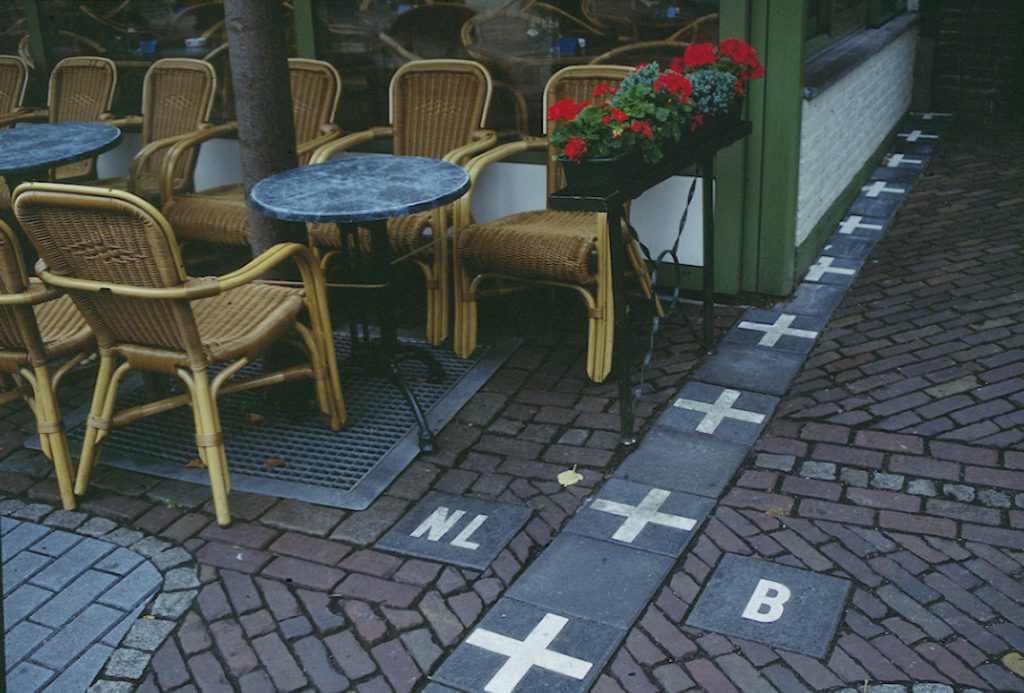We tend to regard free movement as a legal and institutional achievement, but this view overlooks the lived realities in the Global South. Drawing on research in West Africa and South America, Zoé Perko shows how informal practices and historical networks redefine how ‘free movement’ really works
Imagine sitting in a small café and spotting a thin white line on the floor. Pedestrians pass it every few minutes, and then you realise that it divides two countries. You’re sitting in the Netherlands; one step further is Belgium:

Or maybe you’re driving through the city of Geneva. Suddenly, you receive a notification from your cell phone provider: 'Welcome to France. Here is your tariff information'. You look out the window and see a French flag, signalling that you have just passed an international border.
Many Europeans know this feeling. But such situations are not exclusive to Europe. In West Africa and South America, similar invisible borders fade into daily life, challenging what many think about international movements.
Just like the EU, various countries across the world have built alliances to boost trade and create communities. These blocs often make an ambitious pledge to their citizens: the right to move freely. Of course, a person's specific rights still depend upon their citizenship. But these rights also include being able to cross borders without visas, or work in neighbouring states.
Free movement is not the preserve of the EU; in various global contexts citizens can cross borders without visas, or work in neighbouring states
The EU is the poster child of this concept in general academic discourse. But beyond Europe, there are other projects with equally relevant visions.
The Economic Community of West African States (ECOWAS) was founded in 1975. It has since worked to tear down the colonial borders drawn by European powers. Member states want to revive a sense of a shared, borderless space — and shared economic interests. By 1979, ECOWAS had introduced a protocol granting citizens the right to enter, reside, and settle across the region.
In South America, the Southern Common Market (Mercosur) emerged in 1991. What began as a trade project evolved, and by the early 2000s, Mercosur citizens had gained the right to reside in other member states and enjoy simplified border crossings.
Despite these ambitions, the practical realisation of free movement in both regions has proved significantly more complicated.
In West Africa, ECOWAS citizens can, in theory, stay in another member state for 90 days visa-free. But border closures remain common. Nigeria famously shut its borders in 2019, officially to combat smuggling. This was, however, called out for being a pretext to keep migrants out. At the micro level, corruption thrives. Migrants often pay bribes to cross, and refusal can result in denied entry or even abuse.
Ironically, it is European influence that is fuelling certain hurdles to free movement. Through extraterritorial border control, to curb migration toward Europe, the EU funds stricter checkpoints in West Africa. And even if most of the migrants have no intention of leaving the region, these practices directly undermine ECOWAS goals.
Mercosur faces its own struggles. Institutions tasked with implementing mobility rights often lack resources. Politics add another layer. During Mauricio Macri’s 2015–2019 presidency in Argentina, migration policy hardened, leading to deportations and tighter internal checks. Racialised and poor migrants bore the brunt of these harsh measures.
With all these challenges, one might assume regional mobility is largely an illusion. No functioning policy means no real freedom to move — right?
Even if formal implementation is far from perfect, migrants from border regions can move relatively freely across borders
Surprisingly, that’s not what my research found. Even if formal implementation is far from perfect, migrants from border regions can move relatively freely across borders. That's because in regional blocs, free movement doesn’t depend only on formal agreements. It is also the result of informality, history, and a bit of pragmatism rooted in local contexts.
Externally imposed colonial borders sliced through communities that had been connected for centuries. For many, these lines are political fiction which bears no relation to social realities.
In ECOWAS, a family home might straddle two countries — a bedroom in one, a kitchen in the other. A Nigerian vendor might work in a Beninese market just a few steps away. These people may never in their lives need to pass through border control. Similarly, in the Mercosur border regions, ambulances routinely cross into neighbouring states. No one would stop them on an emergency journey to the nearest hospital.
Prior to the imposition of colonial borders, these regions allowed unrestricted mobility. They didn't need policies, border guards, or institutions. Movements that were once regional only became international with the imposition of these boundaries. They were free-movement areas par excellence. In Mercosur, migration is a human right, written into Argentina’s constitution. Rather than attempting to control these impossible circumstances, governments make legal residency relatively easy. Thus, newcomers can register and, of course, pay taxes and contribute to the economy.
Prior to the imposition of colonial borders, many regions allowed unrestricted mobility, without the need for border guards
Geographical circumstances add to this fluidity. Borders stretch across jungles, deserts, and remote landscapes that are hard — and costly — to police. A European-trained mind might assume that such porous borders would be a policy problem requiring stricter control. Yet, policymakers in these two Global South regions often describe attempting to police them as a waste of resources. Some even see borderlessness as crucial to facilitating cross-border movement.
Rather than treating informal movement as a problem, authorities often embrace — or at least tolerate — informality. What emerges is an interesting paradox: informal practices and formal policies are not opposing, but complementary, forces. The realisation of free movement doesn’t derive solely from treaties. It is bound up with local traditions, social networks, and the persistence of human mobility that stretches back tens of millennia.